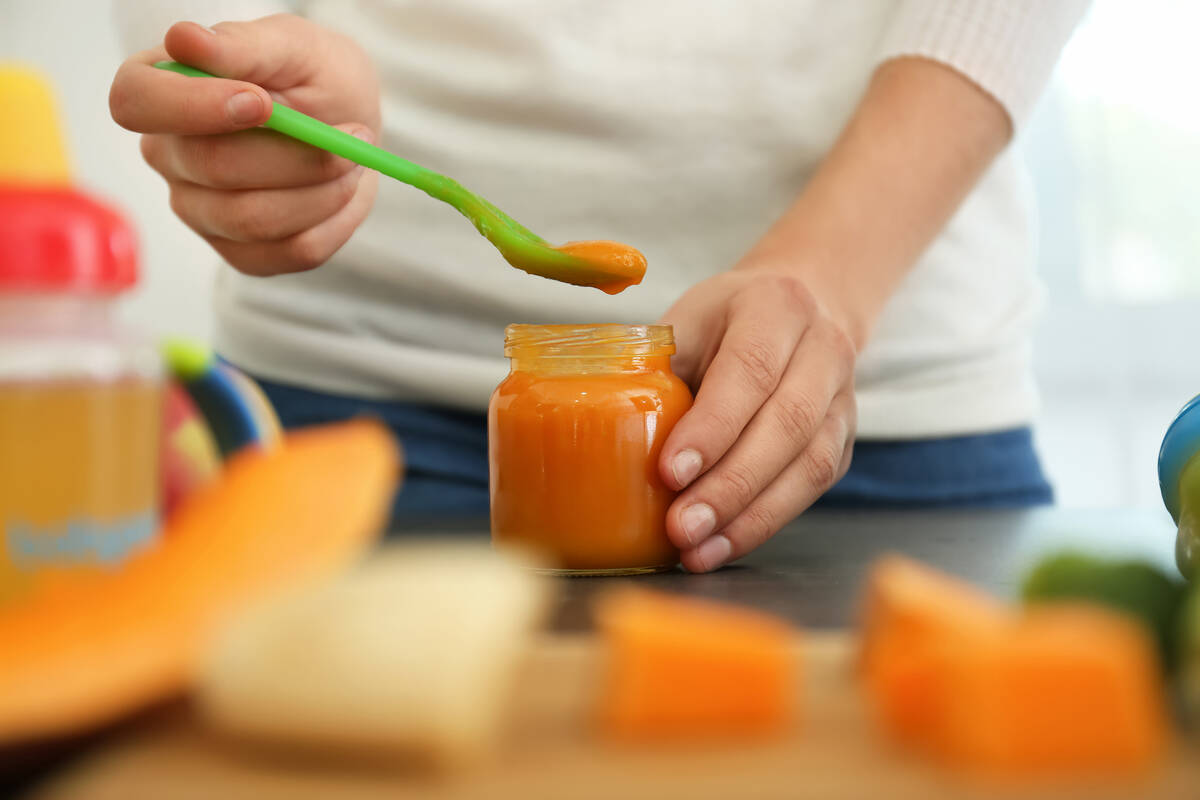Are there ways to avoid heavy metals in baby food?
Question: How do I avoid heavy metals in the food I feed my baby?
Answer: News about heavy metals found in baby food has left parents with a lot of questions.
The low levels of heavy metals found in baby foods likely are a relatively small part of a child’s overall toxic metal exposure risk. However, exposure from all sources should be minimized. Toxic metal exposure can be harmful to the developing brain. It’s been linked to problems with learning, cognition and behavior. But keep in mind that many genetic, social and environment factors influence healthy brain development, and toxic metal exposure is just one.
Metals are found naturally in the Earth’s crust. They also are released into our environment as pollution and get into the water and soil used to grow food. Metals can also get into food from food manufacturing and packaging. Some of the most common metals that get into food, according to the Food and Drug Administration, include inorganic arsenic, lead, cadmium and mercury.
Stronger rules and regulations for testing and limiting the amount of heavy metals in foods for babies and toddlers are important, but parents can take several steps now to reduce the risk that kids will be exposed to toxic metals in their diet and from other sources:
■ Serve a variety of foods: Give your child a well-balanced diet that includes a variety of fruits, vegetables (wash in cool water before preparing and serving), grains and lean protein. Eating a variety of healthy foods that are rich in essential nutrients can lower the exposure to toxic metals and other contaminants found in some foods.
■ Read the labels: Multi-ingredient baby food blends may be a good option. Be aware that many have the same first or second ingredient, though. Different flavor blends, such as kale/pear and spinach/pumpkin, for example, may actually both have sweet potatoes as their first ingredient. It’s important to read the ingredients label to be sure you are offering a true variety of foods.
■ Switch up your grains: Fortified infant cereals can be a good source of nutrition for babies, but rice cereal does not need to be the first or only cereal used. Rice tends to absorb more arsenic from groundwater than other crops. You can include a variety of grains in your baby’s diet, including oat, barley, couscous, quinoa, farro and bulgur. Multigrain infant cereals can be a good choice. Try to avoid using rice milk and brown rice syrup, which is sometimes used as a sweetener in processed toddler foods. Brown rice has more arsenic than other rice. Be sure to rinse rice thoroughly before cooking it, use extra water and drain it before serving.
■ Check your water: Heavy metals can get into tap water. For example, arsenic can contaminate well water, and older pipes may contain lead. You can contact your local health department to have your water tested if this is a concern.
■ Breastfeed if possible: Breastfeeding, rather than formula feeding, also can help reduce exposure to toxic metals. The American Academy of Pediatrics recommends breastfeeding as the sole source of nutrition for your baby for about six months.
■ Avoid fruit juice: Offer toddlers and young children sliced or pureed whole fruits rather than juice. Some fruit juices can contain concerning levels of heavy metals. Plus, juice is high in sugar and not as nutrient rich as whole fruit. Stick with breast milk or formula for babies under 6 months old and water and milk after they reach age 1.
■ Make healthy fish choices: Some types of fish can be high in a form of mercury called methylmercury and other metals. Of most concern are large, predatory fish that eat other fish and live longer, such as shark, orange roughy, swordfish and albacore/white tuna. Eating too much contaminated fish can harm a child’s developing nervous system. But fish is also an excellent source of protein and other nutrients children need, and many are low in mercury. Look for better options such as light tuna (solid or chunk), salmon, cod, whitefish and pollock.
■ Variety is important for homemade baby food, too: Making your own baby food can be cost-effective, can help avoid potential contaminants from processing or packaging, and you can choose the ingredients. But keep in mind that offering a variety of foods is just as important when making your own baby food as when shopping for prepared baby foods.
■ Address lead hazards in your home: There are other important ways to help reduce your baby’s exposure to toxic metals. The most common source of lead exposure, for example, is from peeling or chipping paint from older homes. Soil, some cosmetics and spices, water and certain occupations and hobbies can also be sources of exposure. Find more information about lead at bit.ly/3qZqtAy.
■ Don’t smoke or vape: Secondhand and thirdhand smoke from both regular and e-cigarettes, may expose children to metals such as cadmium and lead. Vaping allows toxic metals from the vape coils to get into the air and be inhaled. Secondhand smoke also contains harmful chemicals that can increase the risk of cancer.
Organic baby foods may have lower levels of certain pesticides and other chemicals. Because heavy metals are found in the soil and can get into prepared foods from processing, however, organic foods often contain similar levels of heavy metals as non-organic foods.
Until more information about metals in baby foods becomes available, experts say there’s no need to get children tested.
If you’re concerned about heavy metals in baby food, talk with your pediatrician.
Dr. Aaron Bernstein is the chair of the American Academy of Pediatrics Council on Environmental Health and Climate Change and a pediatrician at Boston Children’s Hospital.













